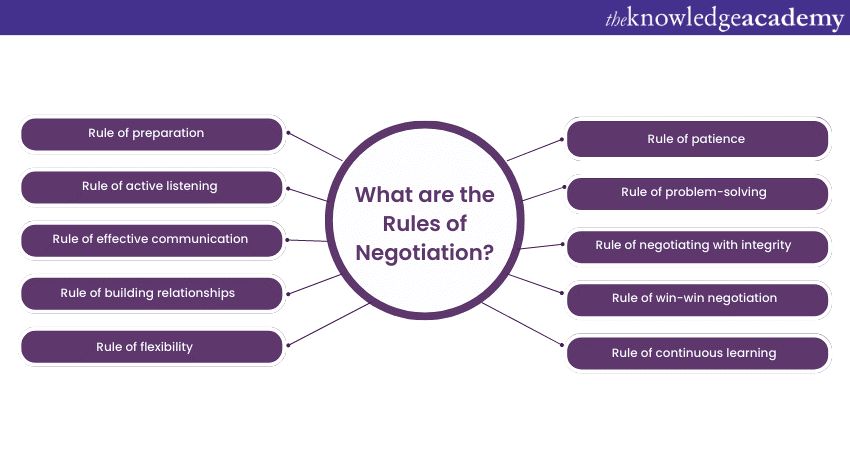We may not have the course you’re looking for. If you enquire or give us a call on + 1-866 272 8822 and speak to our training experts, we may still be able to help with your training requirements.
Training Outcomes Within Your Budget!
We ensure quality, budget-alignment, and timely delivery by our expert instructors.

Negotiation is a fundamental skill in both personal and professional contexts. To achieve successful results, it is essential to follow certain guidelines and strategies. Rules of Negotiation can help you navigate the complexities of bargaining. These rules encompass various aspects, from preparation to communication and from building relationships to problem-solving.
If you wish to enhance your Negotiation Skills and increase the likelihood of reaching mutually beneficial agreements, this blog is what you need. Keep reading to learn the Rules of Negotiation that can help you effectively communicate and make decisions during the Negotiation process.
Table of Contents
1) What are the Rules of Negotiation?
a) Rule of preparation
b) Rule of active listening
c) Rule of effective communication
d) Rule of building relationships
e) Rule of flexibility
f) Rule of patience
g) Rule of problem-solving
h) Rule of negotiating with integrity
i) Rule of win-win Negotiation
j) Rule of continuous learning
2) Conclusion
What are the Rules of Negotiation?
The Rules of Negotiation refer to the guiding principles and strategies that individuals follow to navigate and achieve successful outcomes in a Negotiation process. These rules provide guidelines for effective preparation, communication, problem-solving, and building relationships, among other key aspects of Negotiation. Such top ten rules are as follows:

Learn to communicate more efficiently with Communication Skills Training!
Rule of preparation
Thorough preparation is paramount before entering into any Negotiation. It lays the foundation for success and empowers you with valuable information and insights. Here are the key aspects of preparation:
a) Gathering information: Prior to the Negotiation, invest time in researching the other party. Understand their interests, priorities, and potential alternatives they might have. This knowledge equips you with a deeper understanding of their motivations and allows you to tailor your approach accordingly.
b) Identifying objectives and needs: Clearly define your own objectives and desired outcomes for the Negotiation. Consider what you need to achieve and the trade-offs you are willing to make. By having a clear understanding of your goals, you can effectively communicate and prioritise during the Negotiation.
c) Assessing potential trade-offs: Anticipate the areas where you are willing to compromise and those where you need to stand firm. Identifying potential trade-offs helps you evaluate proposals and make informed decisions during the Negotiation process.
Rule of active listening
Active Listening enables you to know the other party's perspective and build rapport. So, maintain eye contact and give your undivided attention to the speaker. This conveys respect and shows that you value their input. Ask questions for clarity and ensure a clear understanding of their statements.
This helps to uncover underlying interests and motivations. Also, practice empathy by putting yourself in the other party's shoes. Demonstrating understanding and acknowledging their viewpoint fosters a collaborative atmosphere.
Rule of effective communication
Effective communication is vital in Negotiation as it ensures clarity and fosters productive dialogue. Consider these strategies for better communication:
a) Be clear and concise: Express your interests, needs, and proposals in a straightforward manner. Avoid ambiguity to minimise misunderstandings and promote a shared understanding.
b) Active listening and feedback: Engage in active listening to understand the other party's perspective. Provide feedback to show that you have comprehended their message, creating an open and collaborative environment.
c) Promote open dialogue: Encourage open and respectful communication. Create a safe space for the other party to express their thoughts and concerns. This helps foster trust and facilitates constructive Negotiations.
Rule of building relationships
Building relationships based on rapport and trust can have a positive impact on Negotiations. Consider the following strategies:
a) Find common ground: Identify shared interests or goals to establish a foundation for collaboration. This fosters a sense of unity and cooperation, leading to more productive Negotiations.
b) Demonstrate respect: Treat the other party with respect and professionalism. Show that you value their perspective and opinions, even if you disagree. This cultivates a positive atmosphere and encourages reciprocation.
c) Establish a cooperative environment: Encourage a spirit of collaboration rather than confrontation. Seek mutually beneficial solutions and demonstrate a willingness to work together, fostering a long-term cooperative relationship.
Conquer your fear of public speaking with our Public Speaking Training!
Rule of flexibility
Flexibility is a key rule in Negotiation, allowing you to adapt and explore alternative solutions. Consider the following aspects:
a) Importance of adaptability: Being open to alternative solutions is essential for successful Negotiations. Circumstances can change, and being flexible allows you to adjust your approach and explore new possibilities.
b) Benefit of creativity: Thinking outside the box and exploring creative options can lead to innovative solutions. It expands the range of potential agreements and promotes problem-solving beyond traditional boundaries.
c) Balancing assertiveness with flexibility: While it's important to assert your interests, being overly rigid can hinder progress. Striking a balance between assertiveness and flexibility helps create a collaborative environment. This increases the chances of finding win-win outcomes.
Rule of patience
The rule of patience emphasises recognising that Negotiation is often a process that takes time. Consider the following aspects:
a) Value of patience: Being patient allows for a thorough exploration of options and careful consideration of proposals. Rushing to an agreement may lead to suboptimal outcomes or missed opportunities.
b) Avoiding rushed decisions: Patience helps avoid making impulsive decisions driven by time pressure or emotions. It allows for thoughtful analysis and evaluation of alternatives.
c) Managing emotions: Negotiations can be emotionally charged. Patience enables you to manage your emotions effectively, maintaining a calm and composed demeanour. This enhances your ability to make rational decisions and communicate effectively.
Bring productivity to your every interaction with our Effective Communication Skills Course!
Rule of problem-solving
The rule of problem-solving emphasises adopting a mindset focused on addressing conflicts and challenges. Consider the following aspects:
a) Encouraging collaboration: Foster a collaborative atmosphere where both parties actively participate in seeking solutions. Collaboration promotes trust and openness, creating an environment conducive to problem-solving.
b) Seeking mutually beneficial solutions: Look for solutions that meet the interests and requirements of both parties. By focusing on shared goals, you can find win-win outcomes that enhance satisfaction and build strong relationships.
c) Utilising problem-solving techniques: Employ techniques like brainstorming to generate creative ideas and explore different possibilities. Additionally, delve into interests behind positions to identify common ground and areas for compromise.
Rule of negotiating with integrity
The Rule of Negotiation also highlights the importance of maintaining ethical standards in Negotiation. Consider the following aspects:
a) Importance of ethical conduct: Upholding ethical standards builds trust and credibility in Negotiations. It establishes a foundation for open and honest communication.
b) Building trust: Honesty, transparency, and keeping commitments are essential for fostering trust. Demonstrating integrity creates an atmosphere of reliability and promotes collaboration.
c) Avoiding deceptive tactics: Deceptive practices erode trust and can damage long-term relationships. Strive for fairness and honesty throughout the bargaining process.
By negotiating with integrity, you create an environment of trust and respect. This, in turn, can lead to more constructive Negotiations and sustainable agreements.
Rule of win-win Negotiation
The rule of win-win Negotiation emphasises seeking mutually beneficial outcomes for both parties. Consider the following aspects:
a) Concept of win-win: Win-win Negotiation focuses on finding solutions where both parties achieve their objectives. It promotes collaboration and cooperation.
b) Finding common ground: Identifying shared interests and areas of agreement allows for creative problem-solving. Moreover, building on common ground facilitates the development of mutually beneficial solutions.
c) Exploring integrative strategies: Integrative Negotiation strategies aim to maximise value by expanding the available options and creating value for both parties. This approach emphasises joint problem-solving and the creation of new opportunities.
Rule of continuous learning
The rule of continuous learning highlights the importance of ongoing growth and development in Negotiation skills. Consider the following aspects:
a) Value of learning from experiences: Each Negotiation presents an opportunity to learn and improve. Reflecting on past Negotiations allows you to identify strengths and areas for development.
b) Reflecting on successes and failures: Analyse both successful and unsuccessful Negotiation outcomes. Identify the strategies that worked well and those that could be improved upon. Learning from both positive and negative experiences enhances your skills and adaptability.
c) Practice and feedback: Engage in deliberate practice by seeking out opportunities to negotiate and apply new techniques. Solicit feedback from trusted colleagues or mentors to gain insights into your Negotiation performance and identify areas for growth.
d) Ongoing learning: Stay informed about emerging Negotiation trends, strategies, and research. Attend workshops, read books, and participate in relevant training programs to deepen your understanding and expand your Negotiation toolkit.
Learn to negotiate with more confidence with our Negotiation Skills Course!
Conclusion
Mastering the art of Negotiation requires adherence to certain rules and guidelines. Embrace the Rules of Negotiation with dedication, and you can become a skilled negotiator capable of navigating any bargaining scenario with confidence and success.
Try our Assertiveness Skills - How and When to Be Assertive course today!
Frequently Asked Questions
Upcoming Business Skills Resources Batches & Dates
Date
 Public Speaking Course
Public Speaking Course
Fri 17th Jan 2025
Fri 21st Feb 2025
Fri 4th Apr 2025
Fri 6th Jun 2025
Fri 19th Sep 2025
Fri 26th Dec 2025







 Top Rated Course
Top Rated Course



 If you wish to make any changes to your course, please
If you wish to make any changes to your course, please


